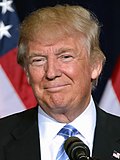| Poll source | Date | 1st | 2nd | 3rd | Other |
|---|
|
| Primary results [6] | March 1, 2016 | Donald Trump32.79% | Ted Cruz30.50% | Marco Rubio24.80% | Ben Carson 5.72%, John Kasich 3.72%, Mike Huckabee 1.17%, Jeb Bush 0.58%, Rand Paul 0.28%, Chris Christie 0.15%, Carly Fiorina 0.10%, Rick Santorum 0.07%, Lindsey Graham 0.06%, Bobby Jindal 0.04% |
| SurveyMonkey [7] Margin of error: ± ?% Sample size: 542 | February 22–29, 2016 | Donald J. Trump
34% | Ted Cruz 27% | Marco Rubio 20% | Ben Carson 8%, John Kasich 4%, Undecided 6% |
| Talk Business/Hendrix [8] Margin of error: ± ?% Sample size: 457 | February 4, 2016 | Ted Cruz
27% | Marco Rubio
23% | Donald J. Trump
23% | Ben Carson 11%, Carly Fiorina 4%, John Kasich 4%, Jeb Bush 1%, Chris Christie 1%, Don't Know 6% |
| Opinion Savvy/Insider Advantage [9] Margin of error: ± 4.7% Sample size: 428 | August 2, 2015 | Donald J. Trump
25.5% | Mike Huckabee
21.4% | Jeb Bush 9.2% | Ted Cruz 8.7%, Ben Carson 8.2%, Scott Walker 4.2%, Rand Paul 3.8%, John Kasich 3.1%, Marco Rubio 2.9%, Chris Christie 2.4%, Rick Perry 1.5%, Carly Fiorina 1.3%, Bobby Jindal 1.3%, Lindsey Graham 0.7%, Rick Santorum 0.3%, George Pataki 0%, Someone else 2.2%, Undecided 3.2% |
| Suffolk University [10] Margin of error: ± 7.5% Sample size: 171 | September 20–23, 2014 | Mike Huckabee
39.27% | Rick Perry 8.38% | Ted Cruz 7.33% | Rand Paul 6.28%, Jeb Bush 4.71%, Chris Christie 4.71%, Marco Rubio 4.71%, Paul Ryan 3.14%, Bobby Jindal 2.62%, Rick Santorum 2.09%, Jon Huntsman Jr. 1.57%, Scott Walker 1.57%, John Kasich 1.05%, Other 2.09%, Undecided 10.47% |
Mitt Romney
32.75% | Mike Huckabee
29.24% | Ted Cruz 6.43% | Rick Perry 6.43%, Chris Christie 2.92%, Rand Paul 2.92%, Paul Ryan 2.34%, Jon Huntsman Jr. 1.75%, Marco Rubio 1.75%, Jeb Bush 1.17%, Rick Santorum 0.58%, Scott Walker 0.58%, Bobby Jindal 0%, John Kasich 0% Undecided 11.11% |
| Public Policy Polling [11] Margin of error: ± 4.5% Sample size: 479 | August 1–3, 2014 | Mike Huckabee
33% | Ted Cruz 12% | Jeb Bush 10% | Chris Christie 8%, Rand Paul 7%, Scott Walker 6%, Bobby Jindal 5%, Marco Rubio 4%, Paul Ryan 3%, Someone else/Not sure 11% |
| Public Policy Polling [12] Margin of error: ± 5.4% Sample size: 342 | April 25–27, 2014 | Mike Huckabee
38% | Ted Cruz 14% | Rand Paul 13% | Jeb Bush 10%, Chris Christie 4%, Bobby Jindal 3%, Marco Rubio 3%, Paul Ryan 3%, Cliven Bundy 2%, Someone else/Not sure 10% |
| Magellan Strategies [13] Margin of error: ± 3.35% Sample size: 857 | April 14–15, 2014 | Mike Huckabee
57% | Rand Paul 9% | Jeb Bush 8% | Chris Christie 6%, Ted Cruz 6%, Marco Rubio 5%, John Kasich 2%, Scott Walker 1%, Undecided 7% |





